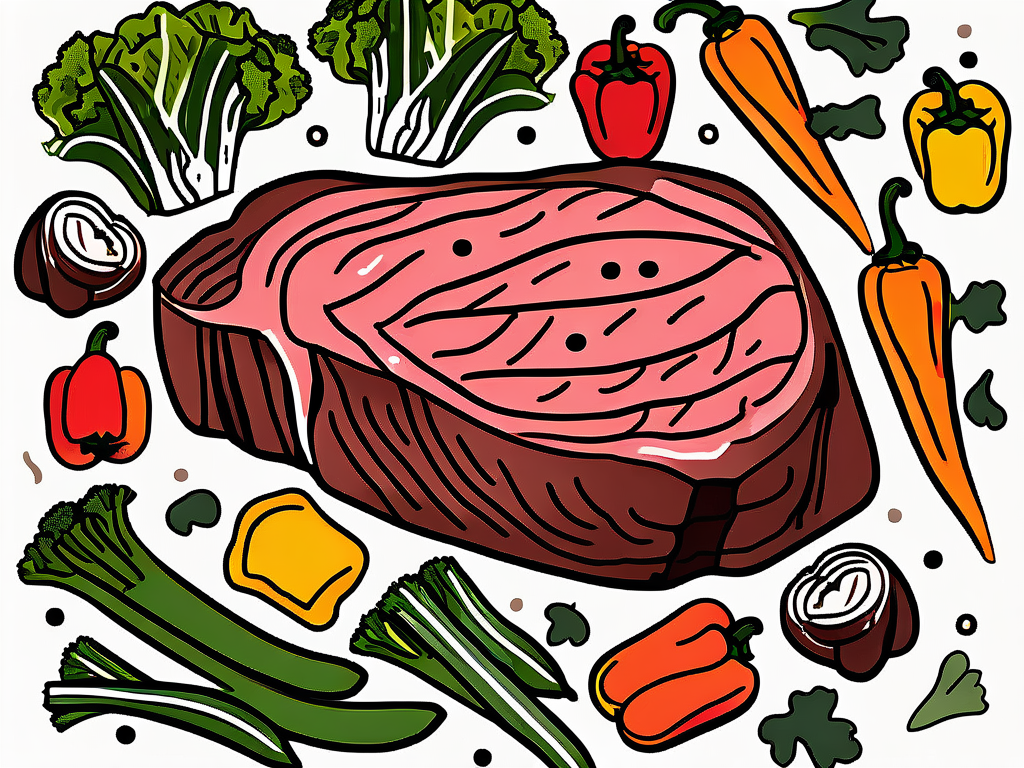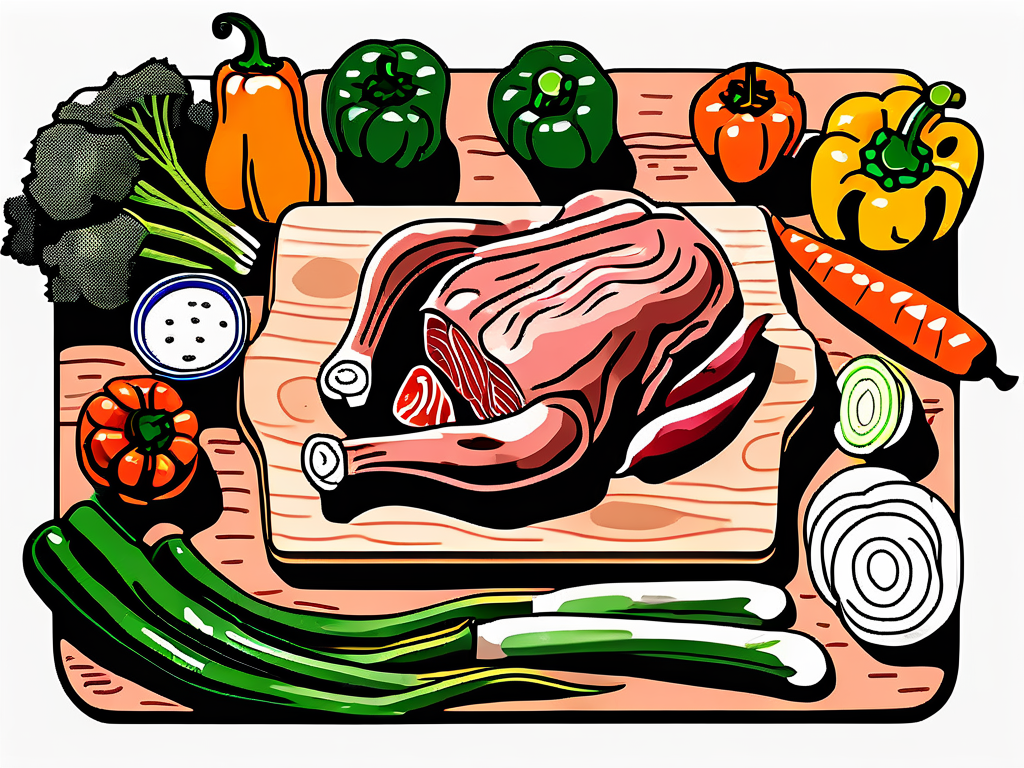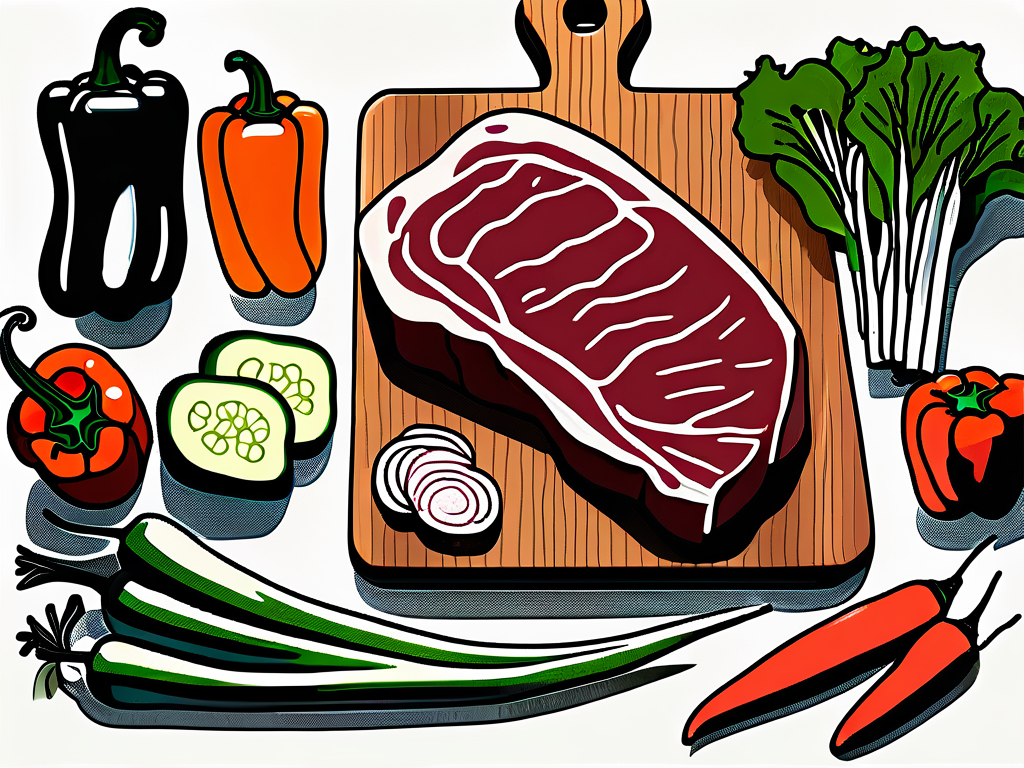In recent years, the low FODMAP diet has gained popularity as a way to manage digestive disorders such as irritable bowel syndrome (IBS). This diet restricts the consumption of certain carbohydrates that can trigger symptoms like bloating, gas, and abdominal pain. While many foods are known to be high in FODMAPs, such as apples, onions, and wheat, there is some confusion when it comes to beef. In this article, we will explore the FODMAP content of beef, its role in a low FODMAP diet, and its potential effects on IBS and digestive health.
Understanding FODMAPs
Before we delve into the specifics of beef and its FODMAP content, it's important to have a basic understanding of what FODMAPs are and their role in digestion.
What are FODMAPs?
FODMAPs are a group of carbohydrates that are poorly absorbed in the small intestine and can ferment in the colon. This fermentation process can lead to the production of gas, causing symptoms such as bloating and discomfort. The acronym FODMAP stands for:
- Fermentable
- Oligosaccharides
- Disaccharides
- Monosaccharides
- And
- Polyols
It's important to note that not all carbohydrates are considered FODMAPs. For example, carbohydrates like rice and quinoa are low in FODMAPs and are generally well-tolerated by individuals with digestive sensitivities.
The Role of FODMAPs in Digestion
In individuals with a sensitivity to FODMAPs, the presence of these carbohydrates can disrupt the balance of bacteria in the gut and cause digestive symptoms. By following a low FODMAP diet, these individuals can help alleviate their symptoms and improve their overall digestive health.
Research has shown that FODMAPs can also have an impact on conditions beyond digestive health. Some studies suggest that reducing FODMAP intake may help alleviate symptoms of conditions such as irritable bowel syndrome (IBS) and inflammatory bowel disease (IBD). By understanding the role of FODMAPs in these conditions, individuals can make informed dietary choices to manage their symptoms effectively.
The FODMAP Content of Beef
Now let's turn our attention to beef and its FODMAP content. It's important to note that the FODMAP levels in beef can vary depending on several factors, including the cut of meat and the method of cooking. However, in general, beef is considered to be low in FODMAPs.

Nutritional Composition of Beef
Beef is a nutrient-dense food that provides important vitamins, minerals, and proteins. It is particularly known for its high-quality protein content, which is essential for muscle growth and repair. Additionally, beef is a rich source of iron, zinc, and vitamin B12.
Iron is crucial for the formation of red blood cells and transporting oxygen throughout the body. Zinc plays a key role in supporting the immune system and wound healing. Vitamin B12 is essential for nerve function and the production of DNA.
How Cooking Methods Affect FODMAP Levels
When it comes to cooking beef, the method used can influence the FODMAP levels. For example, grilling or broiling beef can increase the creation of FODMAPs due to the higher temperatures involved. On the other hand, slow cooking or stewing can help break down the carbohydrates and reduce the FODMAP content.
Marinating beef before cooking can also impact FODMAP levels. Ingredients like garlic or onion in the marinade can contribute to higher FODMAP content, while using herbs and spices like rosemary or thyme can add flavor without increasing FODMAPs.
Comparing Beef to Other Meats
While beef is generally considered low in FODMAPs, it can be helpful to compare its FODMAP content to other meats.

Beef is a rich source of essential nutrients such as iron, zinc, and B vitamins. Iron is crucial for carrying oxygen in the blood, zinc is important for immune function and wound healing, and B vitamins play a key role in metabolism. Grass-fed beef is also known to have higher levels of omega-3 fatty acids compared to conventionally raised beef, offering additional heart-healthy benefits.
FODMAP Levels in Poultry
Poultry, such as chicken and turkey, is also low in FODMAPs and is often recommended as a suitable protein source for those following a low FODMAP diet. However, it's important to note that processed poultry products, such as deli meats, may contain added ingredients that could be high in FODMAPs.
Chicken is a versatile meat that can be prepared in various ways, from grilling and roasting to stir-frying and baking. It is a lean source of protein and is relatively low in saturated fat, making it a healthy choice for many diets. Turkey, especially the white meat, is known for being a lean protein option that is rich in niacin, vitamin B6, and phosphorus.
FODMAP Levels in Fish
Fish is another protein-rich option that is generally low in FODMAPs. It can provide essential omega-3 fatty acids, which have been shown to have numerous health benefits, including reducing inflammation and improving heart health.
Fatty fish such as salmon, mackerel, and sardines are particularly high in omega-3 fatty acids, which are important for brain health and may help reduce the risk of chronic diseases like heart disease. Including a variety of fish in your diet can provide a wide range of nutrients, including protein, vitamins D and B12, and minerals like selenium and iodine.
Incorporating Beef into a Low FODMAP Diet
For individuals following a low FODMAP diet, beef can still be enjoyed in moderation. Here are some tips on incorporating beef into a low FODMAP diet:

Beef is a versatile protein that can be a delicious addition to a low FODMAP diet. By choosing the right cuts of beef and preparing it thoughtfully, individuals can savor the flavor and benefits of this nutrient-rich meat while keeping their FODMAP intake in check.
Choosing the Right Cuts of Beef
Opt for lean cuts of beef that are lower in fat and connective tissue. These include sirloin, tenderloin, and ground beef that is labeled as lean or extra lean. Lean cuts of beef not only help in managing FODMAP levels but also provide essential nutrients like protein, iron, and zinc. When purchasing beef, look for options that are free from added fillers or high FODMAP ingredients to ensure a gut-friendly meal.
Preparing Beef for a Low FODMAP Diet
When preparing beef, it's important to avoid high FODMAP ingredients such as garlic and onion. Instead, use low FODMAP alternatives like garlic-infused oil or the green parts of scallions for flavor. Experimenting with herbs and spices that are gentle on the gut, such as oregano, basil, or paprika, can enhance the taste of beef dishes without triggering FODMAP-related symptoms. Additionally, avoid using marinades or sauces that contain high FODMAP ingredients, and opt for simple yet flavorful seasoning blends to complement the natural taste of beef.
Potential Effects of Beef on IBS and Digestive Health
While beef is generally considered low in FODMAPs, it is important to note that individual tolerance can vary. For some individuals with Irritable Bowel Syndrome (IBS), beef may still trigger symptoms. It is recommended to work with a healthcare professional or registered dietitian to determine personal tolerances and devise a suitable diet plan.
How Beef May Impact IBS Symptoms
In individuals with certain sensitivities, consuming beef may lead to gastrointestinal symptoms such as bloating, gas, and abdominal pain. This can be due to factors other than FODMAPs, such as the fat content or the presence of certain proteins in beef like alpha-gal.
When it comes to fat content, different cuts of beef can vary significantly. For example, lean cuts like sirloin or tenderloin tend to have lower fat content compared to fattier cuts like ribeye or T-bone. The higher fat content in fattier cuts can slow down digestion, potentially exacerbating symptoms in individuals with IBS. It is important to consider the individual's tolerance and choose leaner cuts of beef if necessary.
Furthermore, some individuals with IBS may also have sensitivities to specific proteins found in beef, such as alpha-gal. Alpha-gal is a carbohydrate molecule found in the meat of mammals, including beef. In some cases, individuals who have been bitten by the Lone Star tick may develop an immune response to alpha-gal, leading to allergic reactions and gastrointestinal symptoms. It is crucial for individuals with known sensitivities to alpha-gal to avoid consuming beef or seek medical advice to manage their symptoms effectively.
The Role of Beef in Gut Health
While beef can be enjoyed as part of a balanced diet, it's important to remember that gut health is influenced by a variety of factors, including the diversity of one's diet and overall lifestyle choices. Incorporating a variety of nutrient-dense foods, including lean proteins like beef, can contribute to a healthy gut ecosystem.
Beef is a rich source of essential nutrients such as iron, zinc, and vitamin B12, which are vital for overall health and wellbeing. Iron is essential for the production of red blood cells, while zinc plays a crucial role in immune function and wound healing. Vitamin B12 is necessary for the formation of red blood cells and the proper functioning of the nervous system. Including beef in a well-rounded diet can help ensure an adequate intake of these important nutrients.
Additionally, beef contains high-quality protein, which is essential for muscle growth, repair, and maintenance. Protein also plays a role in satiety, helping individuals feel fuller for longer periods, which can be beneficial for weight management and overall dietary adherence.
Overall, beef is generally considered to be low in FODMAPs, making it a suitable protein option for individuals following a low FODMAP diet. However, individual tolerance may vary, and it is always best to consult with a healthcare professional or registered dietitian to determine personal tolerances and create a suitable diet plan. By understanding the FODMAP content of beef and taking appropriate measures in its preparation, individuals can enjoy the benefits of this nutrient-rich meat as part of a balanced and digestive-friendly diet.